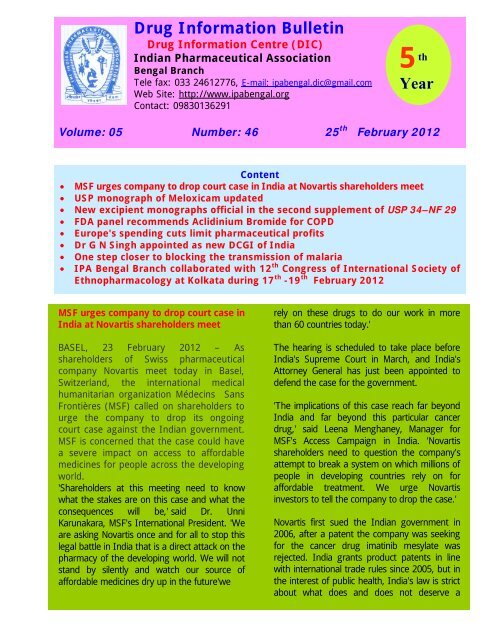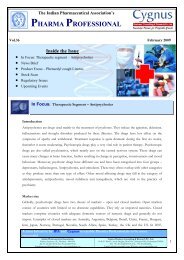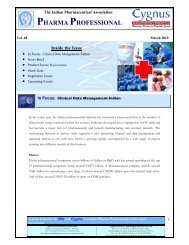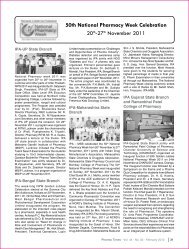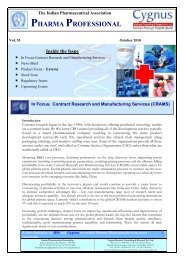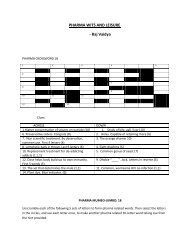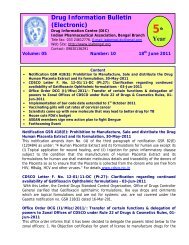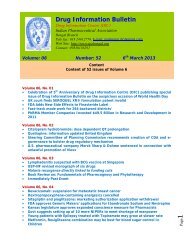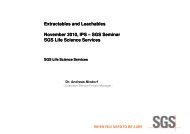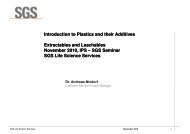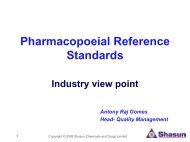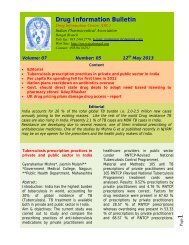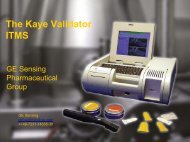Drug Information Bulletin - Indian Pharmaceutical Association
Drug Information Bulletin - Indian Pharmaceutical Association
Drug Information Bulletin - Indian Pharmaceutical Association
Create successful ePaper yourself
Turn your PDF publications into a flip-book with our unique Google optimized e-Paper software.
<strong>Drug</strong> <strong>Information</strong> <strong>Bulletin</strong><br />
<strong>Drug</strong> <strong>Information</strong> Centre (DIC)<br />
<strong>Indian</strong> <strong>Pharmaceutical</strong> <strong>Association</strong><br />
Bengal Branch<br />
Tele fax: 033 24612776, E-mail: ipabengal.dic@gmail.com<br />
Web Site: http://www.ipabengal.org<br />
Contact: 09830136291<br />
5 th<br />
Year<br />
Volume: 05 Number: 46 25 th February 2012<br />
Content<br />
• MSF urges company to drop court case in India at Novartis shareholders meet<br />
• USP monograph of Meloxicam updated<br />
• New excipient monographs official in the second supplement of USP 34–NF 29<br />
• FDA panel recommends Aclidinium Bromide for COPD<br />
• Europe's spending cuts limit pharmaceutical profits<br />
• Dr G N Singh appointed as new DCGI of India<br />
• One step closer to blocking the transmission of malaria<br />
• IPA Bengal Branch collaborated with 12 th Congress of International Society of<br />
Ethnopharmacology at Kolkata during 17 th -19 th February 2012<br />
MSF urges company to drop court case in<br />
India at Novartis shareholders meet<br />
BASEL, 23 February 2012 – As<br />
shareholders of Swiss pharmaceutical<br />
company Novartis meet today in Basel,<br />
Switzerland, the international medical<br />
humanitarian organization Médecins Sans<br />
Frontières (MSF) called on shareholders to<br />
urge the company to drop its ongoing<br />
court case against the <strong>Indian</strong> government.<br />
MSF is concerned that the case could have<br />
a severe impact on access to affordable<br />
medicines for people across the developing<br />
world.<br />
'Shareholders at this meeting need to know<br />
what the stakes are on this case and what the<br />
consequences will be,' said Dr. Unni<br />
Karunakara, MSF's International President. 'We<br />
are asking Novartis once and for all to stop this<br />
legal battle in India that is a direct attack on the<br />
pharmacy of the developing world. We will not<br />
stand by silently and watch our source of<br />
affordable medicines dry up in the future'we<br />
rely on these drugs to do our work in more<br />
than 60 countries today.'<br />
The hearing is scheduled to take place before<br />
India's Supreme Court in March, and India's<br />
Attorney General has just been appointed to<br />
defend the case for the government.<br />
'The implications of this case reach far beyond<br />
India and far beyond this particular cancer<br />
drug,' said Leena Menghaney, Manager for<br />
MSF's Access Campaign in India. 'Novartis<br />
shareholders need to question the company's<br />
attempt to break a system on which millions of<br />
people in developing countries rely on for<br />
affordable treatment. We urge Novartis<br />
investors to tell the company to drop the case.'<br />
Novartis first sued the <strong>Indian</strong> government in<br />
2006, after a patent the company was seeking<br />
for the cancer drug imatinib mesylate was<br />
rejected. India grants product patents in line<br />
with international trade rules since 2005, but in<br />
the interest of public health, India's law is strict<br />
about what does and does not deserve a
patent. Patents are not granted on<br />
modifications of drugs that already exist.<br />
Because Imatinib mesylate was the salt form of<br />
imatinib, the original invention behind the<br />
cancer drug, it was not granted a patent.<br />
Since then, Novartis has been attacking this<br />
part of India's patents law -called Section 3(d) -<br />
in the courts. After losing a legal battle to have<br />
Section 3(d) removed from Indis;s patent law<br />
in 2007, the company is now trying a new legal<br />
tactic to weaken it.<br />
A Novartis win will lead to <strong>Indian</strong> patent offices<br />
granting patents on modifications to drugs<br />
which would otherwise remain off-patent in<br />
India. This would take the substance out of a<br />
public health provision which has already<br />
demonstrated its importance in securing<br />
affordable access to key HIV, TB and cancer<br />
medicines.<br />
MSF has launched a Stop Novartis social media<br />
campaign to draw attention to the implications<br />
of the case and to call on the company to back<br />
down. Alongside other civil society<br />
organizations including Act Up, Oxfam and the<br />
Berne Declaration, MSF is protesting against<br />
the company's actions outside the shareholder<br />
meeting in Basel and outside of Novartis<br />
headquarters in New York.<br />
Generic medicines produced in India make up<br />
80% of the HIV drugs MSF uses to treat<br />
170,000 people in 19 countries.<br />
Source: E drug<br />
USP monograph of Meloxicam<br />
updated<br />
Meloxicam<br />
Type of Posting: Revision <strong>Bulletin</strong><br />
Posting Date: 24–Feb–2012<br />
Official Date: 01–Mar–2012<br />
Expert Committee: Monographs—Small<br />
Molecules 2<br />
Reason for Revision: Compliance<br />
2<br />
In accordance with the Rules and<br />
Procedures of the 2010-2015 Council of<br />
Experts, the Monographs—Small Molecules<br />
2 Expert Committee has revised the<br />
Meloxicam monograph. The purpose for<br />
the revision is to eliminate the use of USP<br />
Meloxicam Related Compound D RS under<br />
the test for Organic Impurities, Procedure<br />
2. Recent evaluation of the current lot of<br />
USP Meloxicam Related Compound D RS<br />
by USP scientific staff has determined that<br />
it is not suitable for its compendial usage<br />
as described in USP 34–NF29.<br />
The Organic Impurities Procedure 2 is<br />
revised as follows:<br />
System suitability stock solution and<br />
System suitability solution are deleted from<br />
the monograph, and the resolution<br />
requirement between meloxicam related<br />
compound D and meloxicam under System<br />
Suitability is deleted.<br />
Meloxicam related compound D is no<br />
longer listed in Table 4 as a specified<br />
impurity eluting at the relative retention<br />
time of 2.4. An impurity eluting at this<br />
relative retention time is now controlled as<br />
an individual unknown impurity. The limit<br />
of this impurity remains unchanged at NMT<br />
0.1%.<br />
The Meloxicam Revision <strong>Bulletin</strong><br />
supersedes the currently official<br />
monograph and will be incorporated in the<br />
Second Supplement to USP 35–NF 30.<br />
Should you have any questions, please<br />
contact Clydewyn Anthony, Ph.D. (301-<br />
816-8139 or cma@usp.org).<br />
Download the Meloxicam Revision <strong>Bulletin</strong><br />
New excipient monographs official in<br />
the second supplement of USP 34–NF<br />
29<br />
• Chitosan<br />
• Polyglyceryl 3 Diisostearate<br />
• Racemethionine
• Hydroxypropyl Corn Starch<br />
• Hydroxypropyl Pea Starch<br />
• Hydroxypropyl Potato Starch<br />
www.uspnf.com<br />
FDA panel recommends Aclidinium<br />
Bromide for COPD<br />
Dow Jones Newswires reports an advisory<br />
panel to the US Food and <strong>Drug</strong><br />
Administration recommends the approval<br />
of aclidinium bromide, a drug made by<br />
Forest Laboratories Inc, intended to treat<br />
chronic obstructive pulmonary disease<br />
(COPD).<br />
"The 12-2 vote of the Pulmonary-Allergy<br />
<strong>Drug</strong>s Advisory Committee on Thursday<br />
came with calls for a post-marketing study<br />
to determine the risk of cardiovascular side<br />
effects," MedPage Today explains. The<br />
company "is seeking approval to market<br />
the drug -- inhaled at a dosage of 400 mcg<br />
twice a day -- for long-term treatment of<br />
bronchospasm associated with COPD,<br />
including chronic bronchitis and<br />
emphysema." The piece adds, "Aclidinium<br />
is a newer type of anticholinergic known as<br />
a long-acting M3 muscarinic antagonist."<br />
Europe's spending cuts limit<br />
pharmaceutical profits<br />
The New York Times reports, "Profits at<br />
pharmaceutical companies have been<br />
declining or showing little growth for the<br />
last year as austerity measures across<br />
Europe lead to cuts in health care<br />
spending. Some analysts say this trend<br />
could continue until at least 2014."<br />
Because of budget constraints, some<br />
European governments are adopting laws<br />
that put "pressure on companies to prove<br />
their drugs are effective or risk having<br />
them dropped from the coverage list, or<br />
covered at a lower rate." The price<br />
slashing can impact emerging markets<br />
because less wealthy nations "refer to the<br />
prices set in Europe to determine their<br />
own." Due to reduced spending from<br />
3<br />
governments, European drug companies<br />
are being focused to draw back research<br />
funds and develop new strategies for<br />
marketing medicines.<br />
Dr G N Singh appointed as new DCGI<br />
of India<br />
Dr G N Singh was today appointed and<br />
given additional charges of the <strong>Drug</strong><br />
Controller General of India (DCGI). Apart<br />
from handling the responsibilities as the<br />
DCGI of the country, he will also handle<br />
responsibilities of his previous office as the<br />
secretary-cum-scientific director of the<br />
<strong>Indian</strong> Pharmacopoeia Commission (IPC).<br />
He has been discharging the functions and<br />
duties of chief scientific and executive<br />
officer in the IPC since January, 2009.<br />
Dr Singh did his Master’s and Doctorate<br />
degrees in <strong>Pharmaceutical</strong> Sciences from<br />
Banaras Hindu University and has an MBA<br />
from University of Hull, UK. At his credit,<br />
he has a long research and administrative<br />
experience of 22 years and has authored<br />
and published about 70 research papers.<br />
His scientific achievements are reflected in<br />
publishing Addendum 2002 to IP 1996 and<br />
Addendum 2005; fifth edition of IP in the<br />
form of IP 2007; Addendum 2008 of IP<br />
2007 and sixth edition of IP 2010. He has<br />
also played a vital role in the publication of<br />
Addendum 2011 to IP 2010, National<br />
Formulary of India (NFI) 2010 and<br />
ensuring availability of IP Reference<br />
substances.<br />
One step closer to blocking the<br />
transmission of malaria<br />
*Geneva, 21 February 2012. *Today, the<br />
first comparative analysis of all currently<br />
available and in-development antimalarials<br />
in terms of the steps they target in the<br />
malaria parasite’s lifecycle has been
published in *PLoS Medicine. *This<br />
research, carried out on 50 anti-infective<br />
molecules by Medicines for Malaria Venture<br />
(MMV) and partners, provides the missing<br />
pieces of the puzzle needed to develop<br />
future medicines able to block transmission<br />
of the parasite from person to person.<br />
Current medicines mostly target the<br />
malaria parasite at the blood stage in its<br />
lifecycle, because this is the step that leads<br />
to clinical symptoms. However, to block<br />
transmission of the parasite, a critical<br />
strategy of the malaria eradication agenda,<br />
we need to be able to kill the parasite at<br />
the sexual and vector (mosquito) stages of<br />
its lifecycle.<br />
Research teams from Imperial College<br />
London, Genomics Institute of the Novartis<br />
Research Foundation, Swiss TPH,<br />
University of Basel, Scripps Research<br />
Institute and MMV were able to reproduce,<br />
in the laboratory, the complex biology of<br />
the malaria parasite throughout its<br />
lifecycle. This then allowed them to test<br />
the activity of the 50 molecules against<br />
each<br />
‘laboratory-produced step’ to determine<br />
exactly where they act.<br />
4<br />
complete data provides us with a<br />
benchmark against which to assess any<br />
newly discovered molecules.”<br />
The original research article entitled: ‘The<br />
Activities of Current Antimalarial <strong>Drug</strong>s on<br />
the Life Cycle Stages of Plasmodium: A<br />
Comparative Study with Human and<br />
Rodent Parasites’, can be accessed free of<br />
charge via the following link:<br />
www.plos.org/media/press/2012/plme-09-<br />
02-leroy.pdf<br />
IPA- Bengal Branch collaborated with<br />
12 th Congress of International Society<br />
of Ethnopharmacology held at<br />
Kolkata during 17 th -19ih February<br />
2012.<br />
The research revealed a number of<br />
interesting findings. Specifically, some<br />
already available antimalarials, such as<br />
pyronaridine and atovaquone, can target<br />
the liver and sexual stages of the parasite<br />
in addition to the blood stage. The<br />
endoperoxide OZ439, currently in Phase II<br />
clinical trials in MMV’s pipeline, and a new<br />
8-aminoquinoline, NPC-1161B, also<br />
demonstrated transmission-blocking<br />
potential.<br />
“These specific findings will be critical in<br />
guiding the selection and combination of<br />
next-generation molecules to succeed<br />
artemisinin combination therapy and will<br />
support the drive to eradicate malaria,”<br />
said Tim Wells, CSO of MMV, “while the<br />
Dr. A. P. J. Abdul Kalam, His<br />
Excellency, Former President of<br />
India delivering inaugural address of<br />
12 th Congress of International<br />
Society of Ethnopharmacology at<br />
Kolkata on 17 th February 2012.


